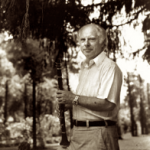Music is meaningful and powerful. And that’s how we should study it.
Biography
Timothy D. Taylor (b. 17 March 1961) is an interdisciplinary social scientist focusing mainly on music and culture. He is the author or editor of six books and over 40 articles and book chapters. His teaching and research cover subjects from capitalism to globalization, identity, consumer culture, and more.
Music is meaningful and powerful. And that’s how we should study it.
Biography
Timothy D. Taylor (b. 17 March 1961) is an interdisciplinary social scientist focusing mainly on music and culture. He is the author or editor of six books and over 40 articles and book chapters. His teaching and research cover subjects from capitalism to globalization, identity, consumer culture, and more.
Bio
Timothy D. Taylor (b. 17 March 1961) is an interdisciplinary social scientist focusing mainly on music and culture. He is the author or editor of six books and over 40 articles and book chapters. His teaching and research cover subjects from capitalism to globalization, identity, consumer culture, and more.
Taylor is the author of Global Pop: World Music, World Markets (Routledge, 1997),Strange Sounds: Music, Technology and Culture(Routledge, 2001),Beyond Exoticism: Western Music and the World (Duke, 2007), and The Sounds of Capitalism: Advertising, Music, and the Conquest of Culture (Chicago, 2012), which won the 2012 John C. Cawelti Award from the Popular Culture Association/American Culture. His collection, Music, Sound, and Technology in America: A Documentary History of Early Phonograph, Cinema, and Radio, co-edited with Mark Katz and Tony Grajeda (Duke, 2012), was awarded a Certificate of Merit in the Association for Recorded Sound Collections Awards for Excellence for Historical Recorded Sound Research in General Topics. His article “The Commodification of Music at the Dawn of the Era of Mechanical Music,’” published in Ethnomusicology in 2007, was awarded the Jaap Kunst Prize by the Society for Ethnomusicology. His work has been supported by a junior fellowship and the Charles A. Ryskamp Fellowship from the American Council of Learned Societies, and the National Humanities Center. He is currently completing a book about music in today’s capitalism, to be published by the University of Chicago Press.
Taylor earned his B.A. as a double major in music and Northern (Environmental) Studies at Middlebury College in 1983, an M.M. in clarinet performance at the Yale School of Music in 1985, an M.A. in 20th century music from the Queen’s University of Belfast in 1990, and an M.A. in 1990 and Ph.D. in musicology in 1993 from the University of Michigan.
As an Irish traditional musician, Taylor started playing the tin whistle as an exchange/fellowship student at the Queen’s University of Belfast in 1988-89. From 2001-04, he studied the flute with Mike Rafferty, a well-known exponent of the east Galway flute style. Taylor initiated a traditional music session in Ann Arbor, Michigan in the early 1990s that is still going, and he has played in sessions around the world. He can most often be heard at the AULD DUBLINER in Long Beach, California, on Sunday afternoons.
Edited Biography
Timothy D. Taylor / UCLA, Department of Ethnomusicology / [email protected]
Timothy D. Taylor is a Professor in the Department of Ethnomusicology at the University of California, Los Angeles. He is the author of numerous articles and books on subjects such as globalization, advertising and consumer culture, capitalism, and technology, including: Global Pop: World Music, World Markets (Routledge, 1997), Strange Sounds: Music, Technology and Culture (Routledge, 2001), Beyond Exoticism: Western Music and the World (Duke, 2007), The Sounds of Capitalism: Advertising, Music, and the Conquest of Culture (Chicago, 2012), Music and Capitalism: A History of the Present (Chicago, 2016), Music in the World: Selected Essays (Chicago, 2017), and editor, with Mark Katz and Tony Grajeda, of Music, Sound, and Technology in America: A Documentary History of Early Phonograph, Cinema, and Radio (Duke, 2012). He is also an accomplished Irish traditional flute player and can be heard regularly at sessions in southern California. [141 words, 947 characters with spaces]
Full Biography
Timothy D. Taylor / UCLA, Department of Ethnomusicology / [email protected]
Timothy D. Taylor (b. 17 March 1961) is an interdisciplinary social scientist focusing mainly on music and culture. He is the author or editor of six books and over 40 articles and book chapters. His teaching and research cover subjects from capitalism to globalization, identity, consumer culture, and more.
Taylor is the author of Global Pop: World Music, World Markets (Routledge, 1997), Strange Sounds: Music, Technology and Culture (Routledge, 2001), Beyond Exoticism: Western Music and the World(Duke, 2007), and The Sounds of Capitalism: Advertising, Music, and the Conquest of Culture (Chicago, 2012), which won the 2012 John C. Cawelti Award from the Popular Culture Association/American Culture. His collection, Music, Sound, and Technology in America: A Documentary History of Early Phonograph, Cinema, and Radio, co-edited with Mark Katz and Tony Grajeda (Duke, 2012), was awarded a Certificate of Merit in the Association for Recorded Sound Collections Awards for Excellence for Historical Recorded Sound Research in General Topics. His article “The Commodification of Music at the Dawn of the Era of Mechanical Music,’” published in Ethnomusicology in 2007, was awarded the Jaap Kunst Prize by the Society for Ethnomusicology. His work has been supported by a junior fellowship and the Charles A. Ryskamp Fellowship from the American Council of Learned Societies, and the National Humanities Center. He is currently completing a book about music in today’s capitalism, to be published by the University of Chicago Press.
Taylor earned his B.A. as a double major in music and Northern (Environmental) Studies at Middlebury College in 1983, an M.M. in clarinet performance at the Yale School of Music in 1985, an M.A. in 20th century music from the Queen’s University of Belfast in 1990, and an M.A. in 1990 and Ph.D. in musicology in 1993 from the University of Michigan.
As an Irish traditional musician, Taylor started playing the tin whistle as an exchange/fellowship student at the Queen’s University of Belfast in 1988-89. From 2001-04, he studied the flute with Mike Rafferty, a well-known exponent of the east Galway flute style. Taylor initiated a traditional music session in Ann Arbor, Michigan in the early 1990s that is still going, and he has played in sessions around the world. He can most often be heard at the AULD DUBLINER in Long Beach, California, on Sunday afternoons. [382 words, 2400 characters with spaces]
Timothy D. Taylor / UCLA, Department of Ethnomusicology / [email protected]
Trained as a classical clarinetist, Timothy D. Taylor started playing the tin whistle as an exchange/fellowship student at the Queen’s University of Belfast in 1988-89. From 2001-04, he studied the flute with Mike Rafferty, a well-known exponent of the east Galway flute style. Taylor originated a traditional music session in Ann Arbor, Michigan in the early 1990s that is still going, and he has played in sessions around the world. He has played in sessions with such Irish traditional music luminaries as Isaac Alderson, Pat Broaders, Sean Cleland, Father Charlie Coen, Brian Conway, Tony DeMarco, Brendan Dolan, Felix Dolan, Félim Egan, Rose Conway Flanagan, Preston Howard, Nuala Kennedy, Zac Léger, Billy McComiskey, Jackie Moran, John Nolan, Patrick Orceau, Mary Rafferty, and others. He can most often be heard at the Auld Dubliner in Long Beach on Sunday afternoons. [138 words, 876 characters with spaces]
1
Social-Cultural Theorist
Social-Cultural Theorist
Theory helps us understand why things are the way they are.
Learn more
2
Performing Musician
Performing Musician
Music making was, and is, an important social medium for me. In sixth grade, I played clarinet (first chair) in the band, and I liked it. So, I just kept going on various instruments.
Learn more
3
Professor Mentor
Professor Mentor
Since completing my Ph.D. in 1993, several significant things have happened. One is the opening up of music studies to other approaches; it is now acceptable to combine music research with serious questions of power, production and culture. Second, ethnomusicology pays a lot more attention to popular music.
4
Scholar Author
Scholar Author
My academic lifetime is marked by tremendous social change. For me, music registers exceptionally clearly what’s going on in the world. Therefore, it becomes important to talk about music as a social, cultural, and historical product.
1
Social-Cultural Theorist
I never liked it when my professors said, “this is the way we’ve always done it.” All these years later, interrogating assumptions still energizes me.
2
Performing Musician
Music making was, and is, an important social medium for me. In sixth grade, I played clarinet (first chair) in the band, and I liked it. So, I just kept going on various instruments.
3
Professor Mentor
Since completing my Ph.D. in 1993, several significant things have happened. One is the opening up of music studies to other approaches; it is now acceptable to combine music research with serious questions of power, production and culture. Second, ethnomusicology pays a lot more attention to popular music.
4
Scholar Author
My academic lifetime is marked by tremendous social change. For me, music registers exceptionally clearly what’s going on in the world. Therefore, it becomes important to talk about music as a social, cultural, and historical product.
Social-Cultural Theorist
Theory helps us understand why things are they way they are.
Performing Musician
Deep hanging out, with music.
Professor Mentor
Always be curious. And don’t be afraid to ask the big questions.
Scholar Author
Music and capitalism. Consumer Culture. Global culture.
I never like it when people say, “This is the way we’ve always done it.” interrogating assumptions is what we are supposed to be doing. I think Marx and Engels were right. We are experiencing ever increasing universal interdependence—and exploitation—in all directions. For me as a musician, music is a good window into all of these processes.
So, I feel compelled to keep asking: How do real people create meaning and value in their lives?
Theoretical Interests + Selected Works
Music and Globalization
My earliest work—which continues—addresses the globalization of popular music, the music industry’s construction of the category of world music, and surrounding questions of authenticity and appropriation.
Selected Works
Global Pop: World Music, World Markets. New York: Routledge. (1997)
Beyond Exoticism: Western Music and the World. Durham: Duke University Press. (2007)
“Music on the Move, as Object, as Commodity.” In The Cambridge World History. Vol. 7, Production, Destruction, and Connection, 1750-Present. Part 2, Shared Transformations?, edited by J. R. McNeill and Kenneth Pomeranz, 205-24. Cambridge: Cambridge University Press. (2015)
“World Music: The Fabrication of a Genre.” In The Routledge Companion to Popular Culture, edited by Toby Miller, 282-91. New York: Routledge. (2014)
“World Music Today.” In Music and Globalization: Critical Encounters, edited by Bob W. White, 172-88. Bloomington: Indiana University Press. (2012)
Music and Technology
While I started my theoretical investigations asking questions about globalization, it became clear I needed to also think about digital technologies and the transmission and appropriation of world music.
Selected Works
Strange Sounds: Music, Technology and Culture. New York: Routledge. (2001)
Music, Sound, and Technology in America: A Documentary History of Early Phonograph, Cinema, and Radio. Co-edited with Mark Katz and Tony Grajeda. Durham: Duke University Press. (2012)
“Neoliberal Capitalism and the Rise of Sampling.” In The Auditory Culture Reader, edited by Michael Bull and Les Back, 446-52. 2d ed. New York: Berg. (2016)
“The Avant Garde in the Family Room.” In The Oxford Handbook of Sound Studies, edited by Trevor Pinch and Karin Bijsterveld, 387-408. New York: Oxford University Press. (2013)
Music, Capitalism, and Other Sorts of Value
Capitalism is the dominate economic system in the world, and one way of understanding the value of music is as its economic value in capitalism. But there are other ways of studying and understanding people’s relationship to music that they conceptualize in terms of value. My current work attempts to theorize the value of music more broadly than simply capitalist economic value, though I continue to study that as well.
Selected Works
The Sounds of Capitalism: Advertising, Music, and the Conquest of Culture. Chicago: University of Chicago Press. (2012)
Music and Capitalism: A History of the Present. Chicago: University of Chicago Press. (2016)
Music in the World: Selected Essays. Chicago: University of Chicago Press. (2017)
The Oxford Handbook of Economic Ethnomusicology. Co-edited with Ann Morcom. New York: Oxford University Press. (Forthcoming)
The Production of Value, and the Value of Production. This book collects some of my recent writings on value and exchange with respect to music. (In Progress)
Show Less
Theory in Keynotes & Invited Papers
“Beyond Flows: Circulation, Value, and Exchange in the Movement of Music.”
Intangible things like music don’t just move in a globalized world, they move because someone somewhere thinks they have value.
- 2018 Third of three inaugural lectures, Anthropology of Music Masterclass/Anthropology of Music Lecture Series, Institut für Ethnologie und Afrikastudien, Joahannes Gutenberg-Universität Mainz. (29 June)
- 2018 Given as a keynote at the conference “Capitalism: Culture and the Individual,” Department of Sociology, San Diego State University. (14 April)
- 2017 Given given as an invited presentation, Music Department Colloquium, University of Pennsylvania. (26 April)
- 2016 First given as a keynote address, “Radio and Ethnomusicology: Historical and Contemporary Perspectives,” Museum of Communication and the University of Edinburgh, Burntisland, Scotland, sponsored by the British Forum for Ethnomusicology. (22 October)
“Musical Performance as a Medium of Value.”
We are accustomed to thinking of money as a medium of value, but how do we think about music performance as a medium of value? This paper argues that value is built up in preparations for performances, and potentially realized at the moment of performance.
- 2018 Second of three inaugural lectures, Anthropology of Music Masterclass/Anthropology of Music Lecture Series, Institut für Ethnologie und Afrikastudien, Joahannes Gutenberg-Universität Mainz. (28 June)
- 2016 Also given as an onvited presentation, Music Studies Colloquium, Music Department, UC, Berkeley. (22 April)
- 2016 First given as an invited presentation, Investigating Musical Performance: Towards a Conjunction of Ethnographic and Historiographic Perspectives, Fondazione Giorgio Cini. (8 July)
“Capitalist and Paracapitalist Values of Cultural Goods.”
Economic value can build up as a commodity moves through supply chains, but value can also be accrued as other goods move through other sorts of supply chains, such as bureaucracies, or the hands through which an artwork passes in its provenance.
- 2018 First of three inaugural lectures, Anthropology of Music Masterclass/Anthropology of Music Lecture Series, Institut für Ethnologie und Afrikastudien, Joahannes Gutenberg-Universität Mainz. (27 June)
“Taking the Gift out and Putting It Back in: From Cultural Goods to Commodities.”
The processes by which a cultural good is commodified are reasonably well known, but there are other processes that work to make a commodified cultural good seem to be a gift.
- 2017 Keynote, “Branding ‘Western Music,’” University of Bern, Switzerland. (8 September)
- 2016 Given as an invited presentation, Department of Music, King’s College, London. (26 October)
- 2016 Given as an invited presentation, Oxford Seminar in Ethnomusicology and Sound Studies, St. John’s College, University of Oxford. (24 October 2016)
- 2016 Given as invited presentation, University of Edinburgh, Edinburgh College of Art, Reid School of Music. (20 October)
“Valuing Music.”
We know how to talk about the value of music when it’s a commodity, but when it’s not a commodity it still has value. And even when it is a commodity people can think of it as having value that’s not capitalist. So how do we talk about this?
- 2017 Also given as a keynote at the conference “Music & Labour,” University of Toronto. (2 April)
- 2016 MB Lee Distinguished Lecture in the Humanities and keynote address, International Musicological Society, East Asia Regional Association, University of Hong Kong. (4 December)
“World Music, Value, and Memory.”
Using the traditional Irish music session as an example, it’s clear that for the musicians, the main value they derive from playing in sessions is not economic but social, the sociality of the session.
- 2014 Keynote address, “The Languages of Popular Music: Communicating Regional Musics in a Globalized World,” University of Osnabrück, Germany. (30 September)
“Meaningful Action: Forms of Value of Cultural Commodities.”
Drawing on Clifford Geertz, this presentation argues that what is culturally and socially understood as value is formed through the actions of social actors.
- 2014 Keynote address, Music – Performance – Contexts: Exploring New Vistas for Interdisciplinary Research, University of Agder, Kristiansand, Norway. (18 June)
- 2014 Also given as a keynote address, Music and Capitalism in Historical and Cross-Cultural Perspective, University of London, Institute of Musical Research. (8 October)
“Finance Capital, the City, and the Appropriation of Music.”
This presentation argues that the rise of finance capital and urbanization in the early 20th century shaped musicians’ perceptions of music as something that could be extracted from its context and appropriated for use in new works.
- 2013 Keynote address, Global Musician Colloquium, Macquarie University, Sydney, Australia. (10 December)
“Music and Neoliberal Capitalism.”
What’s it like working in the music industry since it has become—in the last few decades—part of multi-national conglomerates…the point: record labels used to be standalone companies. Now they’re owned by huge companies that care less about the music than the bottom line, so the working lives of people in those companies have changed dramatically. Ethnography: 80+ interviews.
- 2012 Keynote presentation, Midwest Graduate Music Consortium conference, Northwestern University. (3 March)
“World Music Today.”
This keynote updates my discussion of world music and globalization in my book Global Pop.
- 2009 Keynote address, British Forum for Ethnomusicology, Liverpool. (19 April)
“Consumerism, Sampling, and the Changing Role of the Producer in Contemporary Music.”
- 2003 Keynote address at a symposium organized around my work, “Hearing the Technological Sublime: Sound, New Media, and Society,” SUNY Stony Brook. (25 April)
“Some Versions of Difference: (Post)colonial Hybridities and Transnational Musics, and Third Times.”
- 2001 Invited, keynote-level presentation, Crossing Borders Convocation, the University of Iowa.
- Published in the collection Beyond Exoticism: Western Music and the World. Refiguring American Music, edited by Charles McGovern and Ronald Radano.
“World Music: Keywords.”
- 2001 Keynote presentation, Here, There, or Everywhere: Popmusic, Globalization, and Identity” conference, Amsterdam. (17 October)
“The Global, the Local, and the Digital Flow of Musical Sounds.”
- 2000 Invited keynote-level presentation, Global Connections series, Illinois State University. (4 October)
“Recorded Music in the Early Twentieth Century.”
This presentation argues that the massive boom in recording of non-Western music in the early 20th century was driven by a change in the manufacture of recordings, which, beginning in 1900, could be mass reproduced. Leading record companies needed inventory to sell, and sought it in Asia and elsewhere.
- 2016 Invited presentation, Global Midwest Workshop, Center for Advanced Study, University of Illinois, Urbana-Champaign. (6 February)
“Globalization as a Cultural System.”
- 2006 Keynote address, “Globalization in Contemporary Musical Expressions” conference, University of California, Los Angeles. (20 May)
“The Changing Shape of the Culture Industry; Or, How Did Electronica Music Get into Television Commercials?”
- 2004 Keynote address, South-Central Graduate Music Consortium conference, Duke University. (10 September)
“Consumerism, Sampling, and the Changing Role of the Producer in Contemporary Music.”
What digital samplers do was technologically possible before they were invented. This presentation argues that the reason sampling became so common was because of a heightening of consumer culture beginning in the 1980s, and that musicians increasingly saw other works as things that could be consumed with digital samplers.
- 2003 Keynote address at a symposium organized around my work, “Hearing the Technological Sublime: Sound, New Media, and Society,” SUNY Stony Brook. (25 April)
Show Less
Key Influences
Strictly speaking, I don’t see myself as a music scholar. Rather, my scholarship explores culture, society, and history through people who are involved in making and consuming music.
To understand how I got to this place, I think it’s helpful to know where I came from. While the work and ideas of many other scholars influence me (see my Essential Social Theory Reading List for details) this is a short list of key reference points for my intellectual development.
- Classic social theory.
- Musicology as music and society.
- Classic writing examples.
- Scholarly interlocutors.
Max Weber as filtered through Clifford Geertz and Pierre Bourdieu and others.
Sherry B. Ortner—in dialogue and through her works—for integrating the landscape of social theory with her ethnographic research.
Anthony Seeger’s Why Suyá Sing: A Musical Anthology of an Amazonian People
Chris Waterman’s Jùjú: A Social History and Ethnography of an African Popular Music
Judith Becker’s classic articles: “Time and Tune in Java” and “Is Western Art Music Superior?”
Sherry Ortner’s Not Hollywood: Independent Film in the Twilight of the American Dream.
Show Less
Music making was, and is, an important social medium for me. In sixth grade, I played clarinet (first chair) in the band, and I liked it. So, I just kept going: an M.M. in clarinet at the Yale School of Music; learning tin whistle in Belfast; and studying Irish flute with an émigré master in New Jersey.
I believe there’s a connection between the musical work I do alone (practicing, learning tunes), my social music making (regular Irish sessions), and my research questions (music, meaning, and value).
Current Music-Making
UCLA Department of Ethnomusicology
Director, Irish Music Ensemble
St. Patrick’s Day Show
Daily Bruin Radio – Long Story Short, Music & Culture Show – March 11, 2013.
- Ensemble performance starts at 01:54
- Tim Taylor interview starts at 07:36
After Hours: the Irish pub musician
UCLA Today Magazine – Jessica Nazar – March 12, 2012
Show Less
Meaningful Music Connections
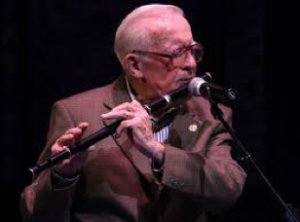 Mike Rafferty was a master of the East Galway flute style, and my Irish flute teacher from 2001 to 2004. Sadly, Mike passed in 2011, but his highly regarded “rolling” style can still be enjoyed thanks to his many recordings and videos. (Some examples follow.) If interested, there’s biographical information here, on the Masters of Traditional Arts site.
Mike Rafferty was a master of the East Galway flute style, and my Irish flute teacher from 2001 to 2004. Sadly, Mike passed in 2011, but his highly regarded “rolling” style can still be enjoyed thanks to his many recordings and videos. (Some examples follow.) If interested, there’s biographical information here, on the Masters of Traditional Arts site.
Live Performance Videos
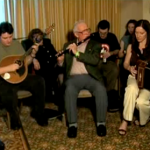 Mike Rafferty playing with the Lilting Banshee with his daughter, Mary Rafferty Clancy on button accordion, and her husband, Donal Clancy on bouzouki. (2008)
Mike Rafferty playing with the Lilting Banshee with his daughter, Mary Rafferty Clancy on button accordion, and her husband, Donal Clancy on bouzouki. (2008)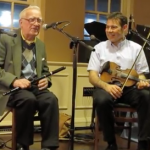 Mike Rafferty & Willie Kelly performing reels “O’Connell’s Trip to Parliament” and “Private Ass and Cart” – Glucksman Ireland House, NYC (April 14, 2011)
Mike Rafferty & Willie Kelly performing reels “O’Connell’s Trip to Parliament” and “Private Ass and Cart” – Glucksman Ireland House, NYC (April 14, 2011)Recordings
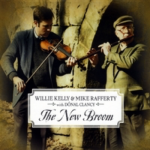 The New Broom
The New Broom
Released in 2009, Mike plays with his frequent collaborators, Willie Kelly (fiddle) and Donal Clancy (guitar).
Listen and Buy
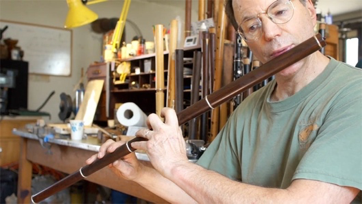
Master craftsman and, in my opinion, the greatest living Irish flute maker. For more biographical info, his address and an interesting interview about how he got started, he is featured on A Guide to the Irish Flute. There’s also an excellent short documentary about Patrick called The Keymaster.
TheSession.org – a user-supported directory to sessions around the world, plus transcriptions of tunes, discussion groups, and a deep index of recordings.
Comhaltas – traditional Irish music society that’s got a worldwide community and videos of great performance masters.
Show Less
Teachers + Instruments

Peggy Lundeen
My grandmother was a pianist, church organist, and my first music teacher.
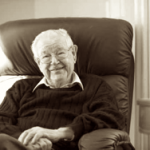
Henry Nelson
A passionate music educator and my high school band director. Mr. Nelson was serious but kind, taught us real discipline, and turned our small town ensemble into something excellent.
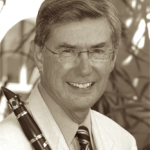
Fred Ormand
In high school, I studied with Fred while he was a professor at Michigan State University. Later Fred moved to University of Michigan, so I was able to study with him again while I worked on my doctoral degree.
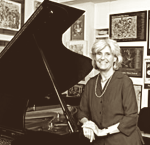
Joan Panetti
Taking and TA’ing for her “Hearing” course at Yale gave me my first model for fully integrating music into one’s intellectual life.

Tiona McSherry
I had my introduction to Irish Tin Whistle in Tiona’s class at Queen’s University, Belfast. This is a video of Tiona McSherry performing Gort na Saileán (Down by the Salley Gardens) based on a poem by Yates – BBC North Ireland (2006)
Pat from Armagh County, Ireland
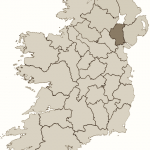 I never got his last name, but Pat from Armagh was a fine Irish Tin whistle teacher I met in the foreign student’s dorm at Queen’s University, Belfast. Thanks Pat!
I never got his last name, but Pat from Armagh was a fine Irish Tin whistle teacher I met in the foreign student’s dorm at Queen’s University, Belfast. Thanks Pat!
Clarinet
I started playing Clarinet in my 6th grade band with a Selmer. When I started studying more seriously, in 1977, I graduated to a Buffet, and completed my M.M. in Clarinet at Yale in 1985 on that same instrument (having also acquired a Buffet in A as well.)
Irish Tin Whistle
In Belfast, while studying at Queen’s University in 1990, I bought my first Tin Whistles.
Irish Flute
I have a Pratten-style flute made by Patrick Olwell and restored Rudall & Rose.
Show Less
Since completing my Ph.D. in 1993, several significant things have happened. One is the opening up of music studies to other approaches; it is now acceptable to combine music research with serious questions of power, production and culture. Second, ethnomusicology pays a lot more attention to popular music.
I want my students (future colleagues) fully equipped to join this conversation. And to keep the conversation productive, it needs to continue to broaden: through peer review, participation in conferences and symposia, and actively connecting students to resources, people, opportunities, and intellectual currents in related fields.
Core Courses
Undergraduate General Education Course
Focus
Studying the mediation of music, both by reproduction technology (radio, phono, sound, film, cassettes, MP3s, etc.), and by corporations.
Outcome
As a general credit course open to non-majors, the goal is to get students thinking like interpretive social scientists: how business and technologies change people’s relationship to music—for good or for ill.
Undergraduate Upper Division Major Course
Focus
This survey reviews major social theory texts, explores how Enthomusicologists have applied those theories in their research, and works through important ethnomusicology research classics.
Outcome
Provides an important overview, in terms of the landscape of classic social theory and where ethnomusicology fits into that.
Topical Graduate Seminar
Focus
A survey of important valuing theories from anthropology—both capitalist and social—to help understand how music is valued commercially, socially, politically.
Outcome
Arms graduate students with the tools they need to further research questions of value regarding music in society.
Show Less
Advisees
- Value
- Consumer Culture
- Marx & Capitalism
- Globalization
- Interpretive Social Science
- Power (Politics, Gender)
- Technology
Eric Schmidt
Dissertation “Rhythms of Value: Tuareg Music and Capitalist Reckonings in Niger” (2018)
Institution Ethnomusicology, UCLA
My Role Committee Chair
Deonte Harris
Dissertation ” ‘Articulations’ in the Caribbean Diaspora: London’s Carnival Arts Scene and the Cultural Politics of Space, Place, and Value” (2018)
Institution Ethnomusicology, UCLA
My Role Committee Chair
Joanna Love
Dissertation “‘The Choice of a New Generation: ‘Pop’ Music, Advertising, and Meaning in the MTV Era and Beyond” (2012)
Institution Musicology, UCLA
My Role Co-chair (with Bob Fink)
Jason Oakes
Dissertation “Losers, Punks, and Queers (and Elvii too): Identification and ‘Identity’ at New York City Music Tribute Events” (2005)
Institution Music (Ethnomusicology), Columbia University
My Role Committee Chair
Kevin Levine
Dissertation “Irish Traditional Music and the Great Recession: Living and Working in the Irish Arts Sector after 2008” (2018)
Institution Ethnomusicology, UCLA
My Role Committee Chair
Leah O’Brien Bernini
Dissertation “The Neoliberalisation of Cultural Production: An Ethnography of Professional Irish Traditional Music” (2016)
Institution World Academy of Music and Dance, University of Limerick
My Role Co-supervisor (with Colin Quigley)
Chloe Coventry
Dissertation “Rock Bands/Rock Brands: Mediation and Musical Performance in Post-liberalization Bangalore” (2013)
Institution Ethnomusicology, UCLA
My Role Committee Chair
(Note: dissertation also addressed Globalization)
Chloe Coventry
Dissertation “Rock Bands/Rock Brands: Mediation and Musical Performance in Post-liberalization Bangalore” (2013)
Institution Ethnomusicology, UCLA
My Role Committee Chair
(Note: dissertation also addressed Marx & Capitalism)
Catherine Appert
Dissertation “Modernity, Remixed: Music as Memory in Rap Galsen” (2012)
Institution Ethnomusicology, UCLA
My Role Committee Chair
Kariann Goldschmitt
Dissertation “Bossa Mundo: Brazilian Popular Music’s Global Transformations (1938-2008)” (2009)
Institution Musicology, UCLA
My Role Committee Chair
León García Corona
Dissertation “Mexico’s Broken Heart: Music, Politics, and Sentimentalism in the Bolero” (2015)
Institution Ethnomusicology, UCLA
My Role Co-chair with Steve Loza
Shelina Brown
Dissertation “Yoko Ono’s Experimental Vocality as Matrixial Borderspace: Theorizing Yoko Ono’s Extended Vocal Technique and Her Contributions to the Development of Underground and Popular Vocal Repertoires, 1968-Present” (2018)
Institution Musicology, UCLA
My Role Committee Chair
Darci Sprengel
Dissertation “DIY Musi and Affective Politics in Post-Mubarak Egypt” (2018)
Institution Musicology, UCLA
My Role Co-Advisor with A.J. Racy
Jennie Gubner
Dissertation “Tango, Not-for-Export: Participatory Music-Making, Musical Activism, and Visual Ethnomusicology in the Neighborhood Tango Scenes of Buenos Aires” (2014)
Institution Ethnomusicology, UCLA
My Role Committee Chair
Elizabeth Keenan
Dissertation “Acting Like a ‘Lady’: Third Wave Feminism, Popular Music, and the White Middle Class” (2008)
Institution Music (Ethnomusicology), Columbia University
My Role Committee Chair
William Hutson
Dissertation “Sonic Affects: Experimental Electronic Music in Sound Art, Cinema, and Performance” (2015)
Institution Department of Theater, UCLA
My Role Co-chair (with Sue-Ellen Case)
Show Less
Recommended Reading
This is a list I often share with graduate students looking for theory grounding and research inspiration. In each topic category, I’ve given the must-reads first (in priority order), then some additional important sources. Enjoy!
- Marx, Marxism, and Capitalism
- Weber, Geert, Bourdieu, and Interpretive Social Science
- Exchange and Value
- Globalization
- Consumer Culture
Must-Reads in Priority Order
- Marx, Karl, and Friedrich Engels. 1964. The Communist Manifesto. Translated by Paul M. Sweezy. New York: Monthly Review.
- Marx, Karl, and Friedrich Engels. 1970. The German Ideology, edited by C. J. Arthur. New York: International.
- Marx, Karl. 1990. Capital: A Critique of Political Economy. Vol. 1. Translated by Ben Fowkes. London: Penguin.
- Williams, Raymond. 1977. Marxism and Literature. New York: Oxford University Press.
- Harvey, David. 2005. A Brief History of Neoliberalism. New York: Oxford University Press.
Additional Category Essentials in Author Alpha Order
- Adorno, Theodor. 1973. Philosophy of Modern Music. Translated by Anne G. Mitchell and Wesley V. Blomster. London: Sheed and Ward.
- Adorno, Theodor. 1976. Introduction to the Sociology of Music. Translated by E. B. Ashton. New York: Continuum.
- Adorno, Theodor. 2001. The Culture Industry, edited by J. M. Bernstein. New York: Routledge.
- Adorno, Theodor. 2002. Essays on Music, edited by Richard Leppert. Translated by Susan H. Gillespie. Berkeley and Los Angeles: University of California Press.
- Attali, Jacques. 1985. Noise: The Political Economy of Music. Translated by B. Massumi. Minneapolis: University of Minnesota.
- Bakhtin, M. M. 1981. The Dialogic Imagination, edited by Michael Holquist. Translated by Caryl Emerson and Michael Holquist. Austin: University of Texas Press.
- Benjamin, Walter. 1969. Illuminations. Translated by Harry Zohn, edited by Hanna Arendt. New York: Schocken Books.
- Duménil, Gérard, and Dominique Lévy. 2004. Capital Resurgent: Roots of the Neoliberal Revolution. Translated by Derek Jeffers. Cambridge: Harvard University Press.
- Foucault, Michel. 2008. The Birth of Biopolitics: Lectures at the Collège de France, 1978–1979, edited by Michel Sennelart.
- Geertz, Clifford. 1983. Local Knowledge: Further Essays in Interpretive Anthropology. New York: Basic.
- Gramsci, Antonio. 1971. Selections from the Prison Notebooks of Antonio Gramsci. New York: International Publishers.
- Harvey, David. 1989. The Condition of Postmodernity: An Enquiry into the Origins of Cultural Change. Cambridge, MA: Basil Blackwell.
- Hebdige, Dick. 1988. Subculture: The Meaning of Style. New York: Routledge.Hebdige, Dick. 1988. Subculture: The Meaning of Style. New York: Routledge.
- Hilferding, Rudolf. 1981. Finance Capital: A Study of the Latest Phase of Capitalist Development, edited by Tom Bottomore. Translated by Morris Watnick and Sam Gordon. London: Routledge.
- Horkheimer, Max, and Theodor Adorno. 1990. Dialectic of Enlightenment. Translated by John Cumming. New York: Continuum.
- Jameson, Fredric. 1984. “Postmodernism, or, the Cultural Logic of Late Capitalism.” New Left Review 146 (July-August): 53–92.
- Jameson, Fredric. 1997. “Culture and Finance Capital.” Critical Inquiry 24: 246–65.
- Lukács, György. 1971. History and Class Consciousness: Studies in Marxist Dialectics. Translated by Rodney Livingstone. Cambridge: MIT Press.
- Williams, Raymond. 1981. Culture. N.p.: Fontana.
- Wolf, Eric R. 1982. Europe and the People without History. Berkeley and Los Angeles: University of California Press.
Must-Reads in Priority Order
- Weber, Max. 2001. The Protestant Ethic and the Spirit of Capitalism. New York: Routledge.
- Weber, Max. 1978a. Economy and Society: An Outline of Interpretive Sociology. Vol. 1, edited by Guenther Roth and Claus Wittich. Translated by Ephraim Fischoff et al. Berkeley: University of California Press.
- Geertz, Clifford. 1973. The Interpretation of Cultures. New York: Basic.
- Bourdieu, Pierre. 1990. The Logic of Practice. Translated by Richard Nice. Stanford: Stanford University Press.
- Ortner, Sherry B. 1996. Making Gender: The Politics and Erotics of Culture. Boston: Beacon.
Additional Category Essentials in Author Alpha Order
- Boltanski, Luc, and Eve Chiapello. 2005. The New Spirit of Capitalism. Translated by David Elliott. New York: Verso.
- Bourdieu, Pierre. 1984. Distinction: A Social Critique of the Judgement of Taste. Translated by Richard Nice. Cambridge: Harvard University Press.
- Bourdieu, Pierre. 1993. The Field of Cultural Production, edited by Randal Johnson. New York: Columbia University Press.
- Bourdieu, Pierre. 1996. The Rules of Art: Genesis and Structure of the Literary Field. Translated by Susan Emanuel. Stanford: Stanford University Press.
- de Certeau, Michel. 1984. The Practice of Everyday Life. Translated by Steven Rendall. Berkeley and Los Angeles: University of California Press.
- Giddens, Anthony. 1971. Capitalism and Modern Social Theory: An Analysis of the Writings of Marx, Durkheim and Max Weber. Cambridge: Cambridge University Press.
- Ortner, Sherry B. 2006. Anthropology and Social Theory: Culture, Power, and the Acting Subject. Durham: Duke University Press.
- Ortner, Sherry B., ed. 1999. The Fate of “Culture”: Geertz and Beyond. Berkeley and Los Angeles: University of California Press.
- Sahlins, Marshall. 1981. Historical Metaphors and Mythical Realities: Structure in the Early History of the Sandwich Islands Kingdom. Ann Arbor: University of Michigan Press.
- Schütz, Alfred. 1951. “Making Music Together: A Study in Social Relationships.” Social Research 18: 76–97.
- Simmel, Georg. 1971. Georg Simmel: On Individuality and Social Forms: Selected Writings. Edited by Donald N. Levine. Chicago: University of Chicago Press.
- Weber, Max. 1978b. Economy and Society: An Outline of Interpretive Sociology. Vol. 2, edited by Guenther Roth and Claus Wittich. Translated by Ephraim Fischoff et al. Berkeley: University of California Press.
- Weber, Max. 2003 [1927]. General Economic History. Translated by Frank H. Knight. Mineola, N.Y.: Dover.
Must-Reads in Priority Order
- Mauss, Marcel. 1990. The Gift: The Form and Reason for Exchange in Archaic Societies. Translated by W. D. Halls. New York: W. W. Norton.
- Appadurai, Arjun, ed. 1986. The Social Life of Things: Commodities in Cultural Perspective. New York: Cambridge University Press.
- Myers Fred R., ed. 2001. The Empire of Things: Regimes of Value and Material Culture. Santa Fe: School of American Research Press.
- Graeber, David. 2001. Toward an Anthropological Theory of Value: The False Coin of Our Own Dreams. New York: Palgrave.
- Tsing, Anna. 2015. The Mushroom at the End of the World. Princeton University Press.
Must-Reads in Priority Order
- Appadurai, Arjun. 1996. Modernity at Large: Cultural Dimensions of Globalization. Minneapolis: University of Minnesota Press
- Castells, Manuel. 1996. The Rise of Network Society. 1996. Vol. 1 of The Information Age: Economy, Society and Culture. Cambridge, MA: Basil Blackwell.
- Castells, Manuel. 1997. The Power of Identity. Vol. 2 of The Information Age: Economy, Society and Culture. Cambridge, MA: Basil Blackwell.
Must-Reads in Priority Order
- Sombart, Werner. 1967. Luxury and Capitalism. Ann Arbor: University of Michigan Press.
- Veblen, Thorstein. [1899] 1994. The Theory of the Leisure Class: An Economic Study of Institutions. New York: Penguin.
- McCracken, Grant. 1988. Culture and Consumption: New Approaches to the Symbolic Character of Consumer Goods and Activities. Bloomington: Indiana University Press.
- Campbell, Colin. 1989. The Romantic Ethic and the Spirit of Modern Consumerism. Cambridge, MA: Basil Blackwell.
- Baudrillard, Jean. 1981. For a Critique of the Political Economy of the Sign. Translated by Charles Levin. St. Louis: Telos.
- Baudrillard, Jean. 1988. Selected Writings. Edited by Mark Poster. Stanford: Stanford University Press.
Show Less
Positions Held
2005 to Present
Professor, Departments of Ethnomusicology and Musicology, University of California, Los Angeles.
- Graduate Vice Chair, Department of Ethnomusicology, 2016-17.
- Director of Graduate Studies, Department of Ethnomusicology, 2015-2017.
- Director, UCLA Ethnomusicology Archive, 2012-15.
- Vice Chair for Graduate Studies, Department of Musicology, 2006-09, 2012-13.
2004-2005
Associate Professor, Departments of Ethnomusicology and Musicology, University of California, Los Angeles.
2002-2004
Associate Professor, Department of Music, Columbia University.
1996-2002
Assistant Professor, Department of Music, Columbia University.
1994-1995
Visiting Assistant Professor, Department of Music, University of California, Berkeley.
1993-1994
Assistant Professor, Department of Music, Denison University (Granville, Ohio).
1995-1996
Visiting Assistant Professor, Department of Ethnic Studies, University of California, Berkeley.
Show Less
Service
Show Less
Applicant Reader
For the following organizations
American Academy in Berlin
American Council of Learned Societies (Annually)
Humanities Fund in Israel
Paris Institute for Advance Studies
National Humanities Center (Annually)
National Science Foundation
Research Council of Norway
Social Sciences and Humanities Research Council of Canada
Swiss National Science Foundation
Show Less
Journal Manuscript Review
- Ethnomusicology Journals
- Humanities Journals
- Musicology Journals
- History, Sociology, Anthropology Journals
- Sociology & Humanities Journals
Critical Studies in Improvisation
Crossings – the electronic journal of Art and Technology
Dancecult: Journal of Electronic Dance Music Culture
Echo: A Music-Centered Journal
Journal of the American Musicological Society
Journal of Popular Music Studies
Show Less
Press Manuscript Review
Blackwell Publishing
Bloomsbury
Duke University Press
Harvard University Press
MIT Press
New York University Press
Oxford University Press
Pennsylvania State University Press
Polity Press
Routledge
Schirmer Books
Temple University Press
University Press of New England
University of California Press
University of Chicago Press
University of Illinois Press
University of Michigan Press
University of Minnesota Press
University of Rochester Press
University of Virginia Press
Wesleyan University Press
Wilfrid Laurier University Press
Show Less
My academic lifetime is marked by tremendous social change. For me, music registers exceptionally clearly what’s going on in the world. Therefore, it becomes important to talk about music as a social, cultural, and historical product.
Value and Exchange
“Beyond Flows: Circulation, Value, and Exchange in the Movement of Music.”
Intangible things like music don’t just move in a globalized world, they move because someone somewhere thinks they have value.
- 2018 Third of three inaugural lectures, Anthropology of Music Masterclass/Anthropology of Music Lecture Series, Institut für Ethnologie und Afrikastudien, Joahannes Gutenberg-Universität Mainz. (29 June)
- 2018 Given as a keynote at the conference “Capitalism: Culture and the Individual,” Department of Sociology, San Diego State University. (14 April)
- 2017 Given given as an invited presentation, Music Department Colloquium, University of Pennsylvania. (26 April)
- 2016 First given as a keynote address, “Radio and Ethnomusicology: Historical and Contemporary Perspectives,” Museum of Communication and the University of Edinburgh, Burntisland, Scotland, sponsored by the British Forum for Ethnomusicology. (22 October)
“Musical Performance as a Medium of Value.”
We are accustomed to thinking of money as a medium of value, but how do we think about music performance as a medium of value? This paper argues that value is built up in preparations for performances, and potentially realized at the moment of performance.
- 2018 Second of three inaugural lectures, Anthropology of Music Masterclass/Anthropology of Music Lecture Series, Institut für Ethnologie und Afrikastudien, Joahannes Gutenberg-Universität Mainz. (29 June)
- 2016 Also given as an onvited presentation, Music Studies Colloquium, Music Department, UC, Berkeley. (22 April)
- 2016 First given as an invited presentation, Investigating Musical Performance: Towards a Conjunction of Ethnographic and Historiographic Perspectives, Fondazione Giorgio Cini. (8 July)
“Capitalist and Paracapitalist Values of Cultural Goods.”
Economic value can build up as a commodity moves through supply chains, but value can also be accrued as other goods move through other sorts of supply chains, such as bureaucracies, or the hands through which an artwork passes in its provenance.
- 2018 First of three inaugural lectures, Anthropology of Music Masterclass/Anthropology of Music Lecture Series, Institut für Ethnologie und Afrikastudien, Joahannes Gutenberg-Universität Mainz. (29 June)
“Taking the Gift out and Putting It Back in: From Cultural Goods to Commodities.”
The processes by which a cultural good is commodified are reasonably well known, but there are other processes that work to make a commodified cultural good seem to be a gift.
- 2017 Keynote, “Branding ‘Western Music,’” University of Bern, Switzerland. (8 September)
- 2016 Given as an invited presentation, Department of Music, King’s College, London. (26 October)
- 2016 Given as an invited presentation, Oxford Seminar in Ethnomusicology and Sound Studies, St. John’s College, University of Oxford. (24 October 2016)
- 2016 Given as invited presentation, University of Edinburgh, Edinburgh College of Art, Reid School of Music. (20 October)
“Valuing Music.”
We know how to talk about the value of music when it’s a commodity, but when it’s not a commodity it still has value. And even when it is a commodity, people can think of it has having value that’s not capitalist. So how do we talk about this?
- 2016 MB Lee Distinguished Lecture in the Humanities and keynote address, International Musicological Society, East Asia Regional Association, University of Hong Kong. (4 December)
- 2017 Also given as a keynote at the conference “Music & Labour,” University of Toronto. (2 April)
- Video Hong Kong Keynote
- Publication “Music in the World – Selected Essays”
“World Music, Value, and Memory.”
Using the traditional Irish music session as an example, it’s clear that for the musicians, the main value they derive from playing in sessions is not economic but social, the sociality of the session.
- 2014 Keynote address, “The Languages of Popular Music: Communicating Regional Musics in a Globalized World,” University of Osnabrück, Germany. (30 September)
“Meaningful Action: Forms of Value of Cultural Commodities.”
Drawing on Clifford Geertz, this presentation argues that what is culturally and socially understood as value is formed through the actions of social actors.
- 2014 Keynote address, Music – Performance – Contexts: Exploring New Vistas for Interdisciplinary Research, University of Agder, Kristiansand, Norway. (18 June)
- 2014 Also given as a keynote address, Music and Capitalism in Historical and Cross-Cultural Perspective, University of London, Institute of Musical Research. (8 October)
Making Value: Music, Capital and the Social.
Making Value examines how people’s conceptions of value inform and shape their production andconsumption of music. Drawing on anthropological value theory, this book theorizes music’s economic and noneconomic forms of value both ethnographically and historically. It covers the creation and exchange of value in a wide range of contexts: indie rock scenes, an Irish traditional music session, the work of music managers, how supply chains function to create various forms of value, how trend-spotters seek out and create value, and how musical performances act as media of value. Making Value shows that to focus on value is to attend to what is meaningful to people as they move through their worlds. Ultimately demonstrating that theorizing value aids us in moving beyond the music itself toward understanding how musicians, workers in the music business, and audiences struggle to make and maintain what they value.
Music in the World: Selected Essays.
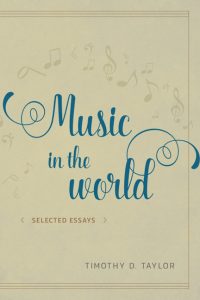 This book is a collection of essays concerned with questions about music in capitalist cultures, covering a historical span that begins in the late nineteenth and early twentieth centuries and continues to the present. These essays look at shifts in the production, dissemination, advertising, and consumption of music from the industrial capitalism of the nineteenth century to the globalized neoliberal capitalism of the past few decades.In addition to chapters on music, capitalism, and globalization, Music in the World includes previously unpublished essays on the continuing utility of the concept of culture in the study of music, a historicization of treatments of affect, and an essay on value and music. Taken together, these essays chart the changes in different kinds of music in twentieth- and twenty-first-century music and culture from a variety of theoretical perspectives. (University of Chicago Press, 2017)
This book is a collection of essays concerned with questions about music in capitalist cultures, covering a historical span that begins in the late nineteenth and early twentieth centuries and continues to the present. These essays look at shifts in the production, dissemination, advertising, and consumption of music from the industrial capitalism of the nineteenth century to the globalized neoliberal capitalism of the past few decades.In addition to chapters on music, capitalism, and globalization, Music in the World includes previously unpublished essays on the continuing utility of the concept of culture in the study of music, a historicization of treatments of affect, and an essay on value and music. Taken together, these essays chart the changes in different kinds of music in twentieth- and twenty-first-century music and culture from a variety of theoretical perspectives. (University of Chicago Press, 2017)
“Circulation, Value, Exchange, and Music.” Ethnomusicology 64, no. 2 (Summer): 254-73.
Portuguese translation, “Circulação, vaor, trocas e música,” in Poderes do Som: Políticas, Escutas e Identitades, edited by José Cláudio S. Castanheira, Dulce Mazer, Pedro Silva Marra, Marcelo Bergamin Conter, Cássio de Borba Lucas, and Mario Arruda, 373-400. Florianópolis, Brazil: Insular Livros, 2020.
“Taking the Gift out and Putting it in Again: From Cultural Goods to Commodities.”
In The Oxford Handbook of Music and Advertising, edited by Siu-Lan Tan, James Deaville, and Ronald Rodman, 378-96. New York: Oxford University Press. (2021)
“Maintenance and Destruction of an East Side Los Angeles Indie Rock Scene.”
In The Oxford Handbook of Economic Ethnomusicology, edited by Anna Morcom and Timothy D. Taylor. New York: Oxford University Press. (2020)
“Circulation, Value, Exchange, and Music.”
https://doi.org/10.5406/ethnomusicology.64.2.0254 Ethnomusicology 64, no. 2 (Summer): 254-73.
“Forms of Value and the Rise of the Virtuoso.”
(Forthcoming) In Branding “Western Music”, edited by Maria Cáceres Piñuel, Alberto Napoli, and Melanie Strumbl. Bern: Peter Lang.
“Musical Performance as a Medium of Value.”
In Investigating Musical Performance: Theoretical Models and Intersections, edited by Gianmario Borio, Giovanni Giuriati, Alessandro Cecchi, and Marco Lutzu, 25-38. London: Routledge. (2020)
“World Music, Value, and Memory.”
Speaking in Tongues: Pop Lokal Global, edited by Dietrich Helms and Thomas Phleps, 103-17. Beiträge zur Popularmusikforschung 42. Bielefeld, Germany: transcript. (2015)
Show Less
Capitalism
“Finance Capital, the City, and the Appropriation of Music.”
This presentation argues that the rise of finance capital and urbanization in the early 20th century shaped musicians’ perceptions of music as something that could be extracted from its context and appropriated for use in new works.
- 2013 Keynote address, Global Musician Colloquium, Macquarie University, Sydney, Australia. (10 December)
The Oxford Handbook of Economic Ethnomusicology.
(Forthcoming) Co-edited with Ann Marcom. The handbook will develop the economics of ethnomusicology into a broad and diverse subfield incorporating approaches and methods from economic anthropology, economic history, and related disciplines. This will greatly expand existing studies of music and economics which have been mostly focused on pop music, music industries, and music in market economies.
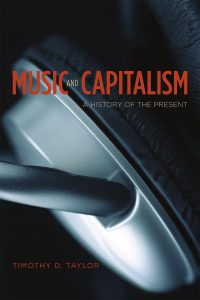 Music and Capitalism: A History of the Present.
Music and Capitalism: A History of the Present.
Big Issues in Music, edited by Philip V. Bohlman and Ronald Radano.
Chicago: University of Chicago Press. (2016)
iTunes. Spotify. Pandora. With these brief words one can map the landscape of music today, but these aren’t musicians, songs, or anything else actually musical—they are products and brands. This book explores just how pervasively capitalism has shaped music over the last few decades. Examining changes in the production, distribution, and consumption of music, it critiques the music industry’s shift in focus from creativity to profits, as well as stories of those who are laboring to find and make musical meaning in the shadows of the mainstream cultural industries.
Drawing on interviews with industry insiders, musicians, and indie label workers, the book traces both the constricting forces of bottom-line economics and the revolutionary emergence of the affordable home studio, the global internet, and the mp3 that have shaped music in different ways.
The Sounds of Capitalism: Advertising, Music, and the Conquest of Culture.
Chicago: University of Chicago Press. (2012)
This book tracks the use of music in American advertising for nearly a century, from variety shows like The Clicquot Club Eskimos to the rise of the jingle, the postwar upsurge in consumerism, and the more complete fusion of popular music and consumption in the 1980s and after.
- Winner of the 2012 John C.Cawelti Award from the Popular Culture Association/American Culture Association.
- Paperback edition, 2014.
- French translation of a portion of chapter 1, “Musique et publicité aux débuts de la radio,” in Penser les musiques populaires, edited by Gérôme Guibert and Guillaume Heuguet, 291-310. Paris: Philharmonie de Paris, 2022.
“The Hip, the Cool, and the Edgy, or the Dominant Cultural Logic of Neoliberal Capitalism.”
Rivista di Analisi e Teoria Musicale 22: 105-24. (2016)
Italian version, “Hip, cool, edgy, ovvero la logica culturale dominante del capitalismo neoliberista,” Analitica: Rivista online di studi musicali 9. (2016)
“Fields, Genres, Brands.”
Culture, Theory and Critique 55: 159-74. (2014)
Included as a chapter in Music in the World.
“Stravinsky and Others.”
AVANT: The Journal of the Philosophical-Interdisciplinary Vanguard 4. (2013)
Included as a chapter in Music in the World.
“The Commodification of Music at the Dawn of the Era of ‘Mechanical Music.’”
Ethnomusicology 51 (Spring/summer): 281-305 (2007)
Awarded the Jaap Kunst Prize by the Society for Ethnomusicology in 2008.
“Exploitation and Exchange in the Southern California Indie Rock Scene.”
(Forthcoming) In The Oxford Handbook of Economic Ethnomusicology, edited by Anna Morcom and Timothy D. Taylor. New York: Oxford University Press.
“Social Class in the Southern California Indie Rock Scene.”
(Forthcoming) In The Bloomsbury Handbook of Popular Music and Social Class, edited by Ian Peddie. London: Bloomsbury.
“Taking the Gift out and Putting it in Again: From Cultural Goods to Commodities.”
(Forthcoming) In The Oxford Handbook of Music and Advertising, edited by Siu-Lan Tan, James Deaville, and Ronald Rodman. New York: Oxford University Press.
“Working in the Cool Capitalism Complex: The Role of Critics in the World Music Field.”
(Forthcoming) In The Cambridge History of Music Criticism, edited by Christopher Dingle. Cambridge: Cambridge University Press.
“Neoliberal Capitalism and the Rise of Sampling.”
In The Auditory Culture Reader, edited by Michael Bull and Les Back, 446-52. 2d ed. New York: Berg. (2016)
“Music on the Move, as Object, as Commodity.”
In The Cambridge World History. Vol. 7, Production, Destruction, and Connection, 1750-Present. Part 2, Shared Transformations?, edited by J. R. McNeill and Kenneth Pomeranz, 205-24. Cambridge: Cambridge University Press. (2015)
“The New Capitalism, UNESCO, and the Reenchantment of Culture.”
In Networking the International System: Global Histories of International Organizations, edited by Madeleine Herren, 163-73. Cham, Switzerland: Springer. (2014)
Included as a chapter in Music in the World.
“Globalized New Capitalism and the Commodification of Taste.”
In The Cambridge History of World Music, edited by Philip Bohlman, 744-64. Cambridge: Cambridge University Press. (2013)
This book was awarded the 2015 Bruno Nettl Prize for the History of Ethnomusicology by the Society for Ethnomusicology.
Included as a chapter in Music in the World.
“Music in the New Capitalism.”
In International Encyclopedia of Media Studies, edited by Angharad Valdivia. Vol. 2, Media Production, edited by Vicki Mayer 151-70. Malden, MA: Wiley-Blackwell. (2013)
“Music and Musical Practices in Postmodernity.”
In Postmodern Music/Postmodern Thought, edited by Judith Lochhead and Joseph Auner, 93-118. New York: Rutledge. (2002)
Podcast / Twenty Thousand Hertz (20k.org) – Episode #49 “Jingles” (2018)
“Odds are if we asked you sing your favorite advertising jingle from when you were a kid, you’d be able to recall every single lyric. Yet we don’t hear many advertising jingles these days. Why is that? This is the story of the rise, fall, and brain science of the jingle. In this episode we talk to UCLA’s Timothy D. Taylor, author of The Sounds of Capitalism, and Durham University’s Kelly Jakubowski.”
Print / VOX.com “You’re not crazy—that catchy song is designed to stick in your head.”
Print / IASPM-US Interview Series Timothy Taylor, The Sounds of Capitalism (2013)
Video / “Sounds of Capitalism” Interview / Subtext Series, University of California TV (UCTV)
Highlight (5 min)
Full Interview (30 min)
Video / TakePart Magazine – Brain Food Daily (BFD), March 2012
3 minutes
Video / Reason TV – Hit & Run, April 2013
23 minutes
Show Less
Globalization
“Music and Neoliberal Capitalism.”
What’s it like working in the music industry since it has become—in the last few decades—part of multi-national conglomerates…the point: record labels used to be standalone companies. Now they’re owned by huge companies that care less about the music than the bottom line, so the working lives of people in those companies have changed dramatically. Ethnography: 80+ interviews.
- 2012 Keynote presentation, Midwest Graduate Music Consortium conference, Northwestern University. (3 March)
- Published as a chapter in my book “Music and Capitalism“
“World Music Today.”
This keynote updates my discussion of world music and globalization in my book Global Pop.
- 2009 Keynote address, British Forum for Ethnomusicology, Liverpool. (19 April)
- Published in the collection “World Music Revisited.” In Music and Globalization: Critical Encounters, edited by Bob W. White.
“Consumerism, Sampling, and the Changing Role of the Producer in Contemporary Music.”
What digital samplers do was technologically possible before they were invented. This presentation argues that the reason sampling became so common was because of a heightening of consumer culture beginning in the 1980s, and that musicians increasingly saw other works as things that could be consumed with digital samplers.
- 2003 Keynote address at a symposium organized around my work, “Hearing the Technological Sublime: Sound, New Media, and Society,” SUNY Stony Brook. (25 April)
- Published in the collection Beyond Exoticism: Western Music and the World. Refiguring American Music, edited by Charles McGovern and Ronald Radano.
“Some Versions of Difference: (Post)colonial Hybridities and Transnational Musics, and Third Times.”
- 2001 Invited, keynote-level presentation, Crossing Borders Convocation, the University of Iowa.
- Published in the collection Beyond Exoticism: Western Music and the World. Refiguring American Music, edited by Charles McGovern and Ronald Radano.
“World Music: Keywords.”
- 2001 “Here, There, or Everywhere: Pop Music, Globalization, and Identity” conference, Amsterdam.
“The Global, the Local, and the Digital Flow of Musical Sounds.”
- 2000 Invited keynote-level presentation, Global Connections series, Illinois State University.
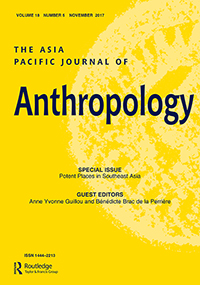 Contemporary Ethnomusicology in the Asia-Pacific Region.
Contemporary Ethnomusicology in the Asia-Pacific Region.
Co-edited with Kirsty Gillespie. Special issue of The Asia Pacific Journal of Anthropology. Volume 10, Issue 2. (2009)
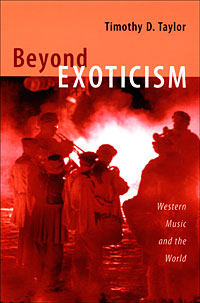 Beyond Exoticism: Western Music and the World.
Beyond Exoticism: Western Music and the World.
Refiguring American Music, edited by Charles McGovern and Ronald Radano. Durham: Duke University Press. (2007)
Polish translation of a portion of chapter 1, “Tonalność,” Glissando 41 (2021), 49-51.
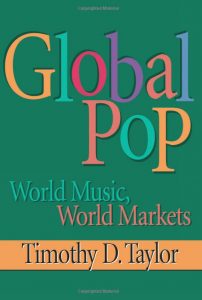 Global Pop: World Music, World Markets.
Global Pop: World Music, World Markets.
New York: Rutledge. (1997)
Nominated for Gleason Music Book Award (sponsored by New York University, Broadcast Music, Inc., and Rolling Stone magazine).
Nominated for the Best Popular Music Book of the Year award by the International Association for the Study of Popular Music (American chapter).
Reprints
The chapter “We Are the World, and the World Is Us” reprinted in excerpted form in Globalization: Critical Concepts in Sociology, edited by Roland Robertson and Kathleen White. London: Routledge, 2003.
An excerpt from the chapter “Strategic Inauthenticity” reprinted in The Globalization Reader, edited by Frank J. Lechner and John Boli. 2nd-4th editions. Malden, MA: Blackwell, 2004, 2007, 2012.
The chapter “‘Nothin’ but the Same Old Story’: Old Hegemonies, New Musics,” reprinted in excerpted form in Peter Gabriel, from Genesis to Growing Up, edited by Michael Drewett, Sarah Hill, and Kimi Kärki, 131-40. Aldershot, UK: Ashgate, 2010.
Translation
Chinese translation, to be published by Shanghai Century Publishing Group.
“The Hip, the Cool, and the Edgy, or, the Dominant Cultural Logic of Neoliberal Capitalism.”
Analitica. (2016)
“Les festivals de musiques du monde: La diversité comme genre.”
Cahiers d’ethnomusicologie 27: 49-63. (2014)
“On Identity: Contemporary Music Research in the Asia-Pacific Region.”
With Kirsty Gillespie. Introduction to The Asia Pacific Journal of Anthropology, “Contemporary Ethnomusicology in the Asia-Pacific Region” 10 (June): 75-79. (2009)
“World Music in Television Ads.”
American Music 18 (summer): 162-92. (2000)
Nominated for the Alfred Einstein Award for outstanding article in musicology.
“Peopling the Stage: Opera, Otherness, and New Musical Representations in the Eighteenth Century.”
Cultural Critique 36 (spring): 55-88. (1997)
“Music, Ethno/musicology, Theory.”
(Forthcoming) In World Studies: A Reader, edited by Stephen Chu and Shu-mei Shih. Durham: Duke University Press.
“Which Globalization? Whose World Music? On Historicizing, Particularizing, and Finding Value.”
In The Oxford Handbook of Global Popular Music, edited by Simone Krüger Bridge. New York: Oxford University Press. (2022)
“Identities and Tourisms in Globalized Neoliberal Capitalist Cultures.”
Afterword. In The Globalization of Musics in Transit: Music Migration and Tourism, edited by Simone Krüger and Ruxandra Trandafoiu, 318-25. London: Rutledge. (2014)
“World Music: The Fabrication of a Genre.”
In The Routledge Companion to Global Popular Culture, edited by Toby Miller, 282-91. New York: Routledge. (2014)
“Capitalisms and Cosmopolitanisms.”
Afterword to More than Bollywood: Studies in Indian Popular Music, edited by Gregory D. Booth and Bradley Shope, 316-20. New York: Oxford University Press. (2013)
“World Music Today.”
In Music and Globalization: Critical Encounters, edited by Bob W. White, 172-88. Bloomington: Indiana University Press. (2012)
“World Music Revisited.”
In Musik und kulturelle Identität: Bericht über den VIII. Internationalen Kongress der Gesellschaft für Musikforschung Weimar 2004. Vol. 1, edited by Detlef Altenburg and Rainer Bayreuther, 145-53. Kassel: Bärenreiter. (2010)
“Bad World Music.”
In Bad Music: The Music We Love to Hate, edited by Chris Washburne and Maiken Derno, 83-103. New York: Routledge. (2004)
“Some Versions of Difference: Discourses of Hybridity in Transnational Musics.”
In Global Currents: Media and Technology Now, edited by Tasha G. Oren and Patrice Petro, 219-44. New Brunswick, NJ: Rutgers University Press. (2004)
“A Riddle Wrapped in a Mystery: Transnational Music Sampling and Enigma’s ‘Return to Innocence.’”
In Technoculture and Music, edited by René T. A. Lysloff and Leslie Gay, Jr., 64-92. Middletown, CT: Wesleyan University Press. (2003)
“Korla Pandit: Music, Exoticism and Mysticism.”
Credit Where Credit’s Due
PDF [Tim, can you get me the file or the link? I searched on the magazine’s website but didn’t find anything: https://www.songlines.co.uk/Search?query=1999]
Songlines [London], Issue #[what?] (Summer/Autumn), 1999, pages 26-7.
An expanded version appeared in Beyond Exoticism: Western Music and the World. Refiguring American Music, edited by Charles McGovern and Ronald Radano.
Ry Cooder’s Next Grammy
Village Voice, December 9, 1997, page 88.
PDF [Tim, can you get me the file? No archives available online for Village Voice]
Show Less
Consumer Culture
“Recorded Music in the Early Twentieth Century.”
This presentation argues that the massive boom in recording of non-Western music in the early 20th century was driven by a change in the manufacture of recordings, which, beginning in 1900, could be mass reproduced. Leading record companies needed inventory to sell, and sought it in Asia and elsewhere.
- 2016 Invited presentation, Global Midwest Workshop, Center for Advanced Study, University of Illinois, Urbana-Champaign. (6 February)
“Globalization as a Cultural System.”
- 2006 Keynote address, “Globalization in Contemporary Musical Expressions” conference, University of California, Los Angeles.
“The Changing Shape of the Culture Industry; Or, How Did Electronica Music Get into Television Commercials?”
- 2004 Keynote address, South-Central Graduate Music Consortium conference, Duke University.
- Published in Television and New Media 8 (August): 235-58, 2007.
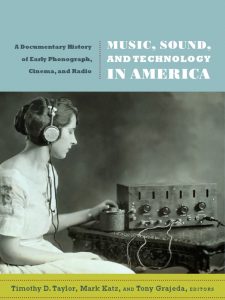 Music, Sound, and Technology in America: A Documentary History of Early Phonograph, Cinema, and Radio.
Music, Sound, and Technology in America: A Documentary History of Early Phonograph, Cinema, and Radio.
Co-edited with Mark Katz and Tony Grajeda. Durham: Duke University Press. (2012)
Awarded a Certificate of Merit in the Association for Recorded Sound Collections
Awards for Excellence for Historical Recorded Sound Research in General Topics.
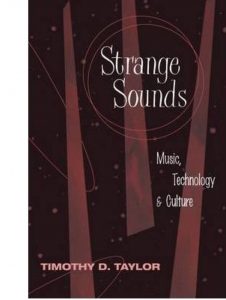 Strange Sounds: Music, Technology and Culture.
Strange Sounds: Music, Technology and Culture.
New York: Routledge. (2001)
Nominated for the Best Popular Music Book of the Year by the International Association for the Study of Popular Music (American chapter).
“The Rise of the Jingle.”
“Advertising and the Conquest of Culture.”
Social Semiotics 4 (December): 405-25. (2009)
“The Changing Shape of the Culture Industry; Or, How Did Electronica Music Get into Television Commercials?”
Television and New Media 8 (August): 235-58. (2007)
“Music and Advertising in Early Radio.”
Echo 5, Issue 2 (fall) (2003)
“Working in the Cool Capitalism Complex: The Role of Critics in the World Music Field.”
In The Cambridge History of Music Criticism, edited by Christopher Dingle, 527-41. Cambridge: Cambridge University Press. (2019)
“Music in Advertising.”
In Handbook of Popular Music, edited by Andy Bennett and Steve Waksman, 154-67. Thousand Oaks, CA: Sage. (2015)
“Performance and Nostalgia on the Oldies Circuit.”
In Sound Souvenirs: Audio Technologies, Memory and Cultural Practices, edited by Karin Bijsterveld and José van Dijck, 94-106. Amsterdam: Amsterdam University Press. (2009)
Interview by Matt McButter and Mike Weider, Beatseeker (2022)
“You’re not Crazy—that Catchy Song is Designed to Stick in Your Head.” Vox.com (2019)
Video / Subtext Series, University of California TV (UCTV)
Interview Highlight (5 min)
Full Interview (30min)
Print / VOX.com “You’re Not Crazy—that catchy song is designed to stick in your head.”
The history of “earworms” goes back as early as the eighth century BC and can be found in jingles and pop culture hits of today. Vox Creative, 2018.
Podcast / “Jingle Brains”
Twenty Thousand Hertz Podcast with James Introcaso, 2018.
Podcast / “Jingle Brains”
Between the Liner Notes Podcast with Matthew Billy, May 2016.
Radio / “Advertising and Pop Music”
WBUR / On Point with Tom Ashbrook, December 18, 2012.
Radio / Timothy Taylor on The Sounds of Capitalism
Print / IASPUM-US Interview Series: Timothy D Taylor, The Sounds of Capitalism
International Association for the Study of Popular Music – US Chapter / Josh Ottum, April 15, 2013.
Print / The Sounds of Capitalism: Q &A with Timothy D Taylor
Pitchfork – Paper Trail Feature / Eric Harvey, February 4, 2013
Print / I’d Like to Teach the World to Sell
UCLA Magazine / Jack Feuer, July 1, 2012
Show Less
Cultural Business
In the Factory of Fine Arts: Nickel-and Dime Capitalism in the First Decades of Television Background Music.
(Forthcoming) This book is the history of background music in television, from 1940s into the 1980s.
Working Musicians: Labor and Creativity in Film and Television Production.
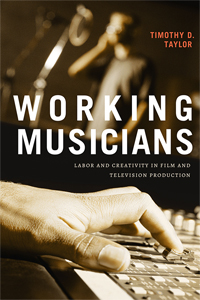 This book offers a behind-the-scenes look at the labor of the mostly unknown composers, music editors, orchestrators, recording engineers, and other workers involved in producing music for films, television, and video games. Drawing on dozens of interviews with music workers in Los Angeles, it explores the nature of their work and how they understand their roles in the entertainment business. The book traces how these cultural laborers have adapted to and cope with the conditions of neoliberalism as, over the last decade, their working conditions have become increasingly precarious. Digital technologies have accelerated production timelines and changed how content is delivered, while new pay schemes have emerged that have transformed composers from artists into managers and paymasters. It demonstrates that as bureaucratization and commercialization affect every aspect of media, the composers, musicians, music editors, engineers, and others whose soundtracks excite, inspire, and touch millions face the same structural economic challenges that have transformed American society, concentrating wealth and power in fewer and fewer hands. (Duke University Press, 2023)
This book offers a behind-the-scenes look at the labor of the mostly unknown composers, music editors, orchestrators, recording engineers, and other workers involved in producing music for films, television, and video games. Drawing on dozens of interviews with music workers in Los Angeles, it explores the nature of their work and how they understand their roles in the entertainment business. The book traces how these cultural laborers have adapted to and cope with the conditions of neoliberalism as, over the last decade, their working conditions have become increasingly precarious. Digital technologies have accelerated production timelines and changed how content is delivered, while new pay schemes have emerged that have transformed composers from artists into managers and paymasters. It demonstrates that as bureaucratization and commercialization affect every aspect of media, the composers, musicians, music editors, engineers, and others whose soundtracks excite, inspire, and touch millions face the same structural economic challenges that have transformed American society, concentrating wealth and power in fewer and fewer hands. (Duke University Press, 2023)
Show Less
Technology
 Music, Sound, and Technology in America: A Documentary History of Early Phonograph, Cinema, and Radio.
Music, Sound, and Technology in America: A Documentary History of Early Phonograph, Cinema, and Radio.
Co-edited with Mark Katz and Tony Grajeda. Durham: Duke University Press. (2012)
Awarded a Certificate of Merit in the Association for Recorded Sound Collections.
Awards for Excellence for Historical Recorded Sound Research in General Topics.
 Strange Sounds: Music, Technology and Culture.
Strange Sounds: Music, Technology and Culture.
New York: Routledge. (2001)
Nominated for the Best Popular Music Book of the Year by the International Association for the Study of Popular Music (American chapter).
“Music and the Rise of Radio in 1920s America: Technological Imperialism, Socialization, and the Transformation of Intimacy.”
Historical Journal of Film, Radio and Television 22 No. 4 (October): 425-43. (2002)
Reprinted in Wired for Sound: Engineering and Technology in Sonic Cultures, edited by Thomas Porcello and Paul Greene, 245-68. Middletown, CT: Wesleyan University Press, 2004.
“The Role of Opera in the Rise of Radio in the United States.”
In Music and the Broadcast Experience: Performance, Production, and Audience, edited by Christina L. Baade and James A. Deaville, 69-90. New York: Oxford University Press. (2016)
Included as a chapter in Music in the World.
“The Avant Garde in the Family Room.”
In The Oxford Handbook of Sound Studies, edited by Trevor Pinch and Karin Bijsterveld, 387-408. New York: Oxford University Press. (2013)
“Music and Digital Culture: New Forms of Consumption and Commodification.”
In Digital Media: Transformation in Human Communication, edited by Paul Messaris and Lee Humphreys, 87-94. New York: Peter Lang. (2006)
“Music at Home, Politics Afar.”
In Decomposition: Post-Disciplinary Performance, edited by Philip Brett, Sue-Ellen Case, and Susan Leigh Foster, 135-69. Bloomington: Indiana University Press. (2000)
Included as a chapter in Strange Sounds.
“Sonic Sculptor: Suzanne Ciani,”
Lost Notes, 9 May, 2019.
Show Less
Music and Power (Gender, Politics)
“Moving in Decency: The Music and Radical Politics of Cornelius Cardew.”
Music & Letters 79, No. 4 (November): 555-76. (1998)
Reprinted in Music and Protest, edited by Ian Peddie, 249-70. Burlington, VT: Ashgate. (2012)
“The Gendered Construction of the Musical Self: The Music of Pauline Oliveros.”
Musical Quarterly 77 (Fall): 385-96. (1993)
“Social Class the Negotiation of Selling Out in a Southern California Indie Rock Scene.”
In The Bloomsbury Handbook of Popular Music and Social Class, edited by Ian Peddie, 59-75. London: Bloomsbury. (2020)
Show Less
Ireland
“Living in a Postcolonial World: Class and Soul in The Commitments.”
Irish Studies Review 6 (December): 291-302. (1998)
“Gaelicer Than Thou” (Afterword)
Celtic Modern: Music at the Global Fringe, edited by Martin Stokes and Philip Bohlman, 275-84. Lanham, MD: Scarecrow Press. (2003)
Show Less
General Topics
“Standout Jingles”
Interview by Steve Kraske, Up to Date, KCUR radio, 2 March 2022.
Interview: Capitalism and the Value of Music, Sound Expertise: Conversations with Scholars about Music.
Episode 110, 2020.
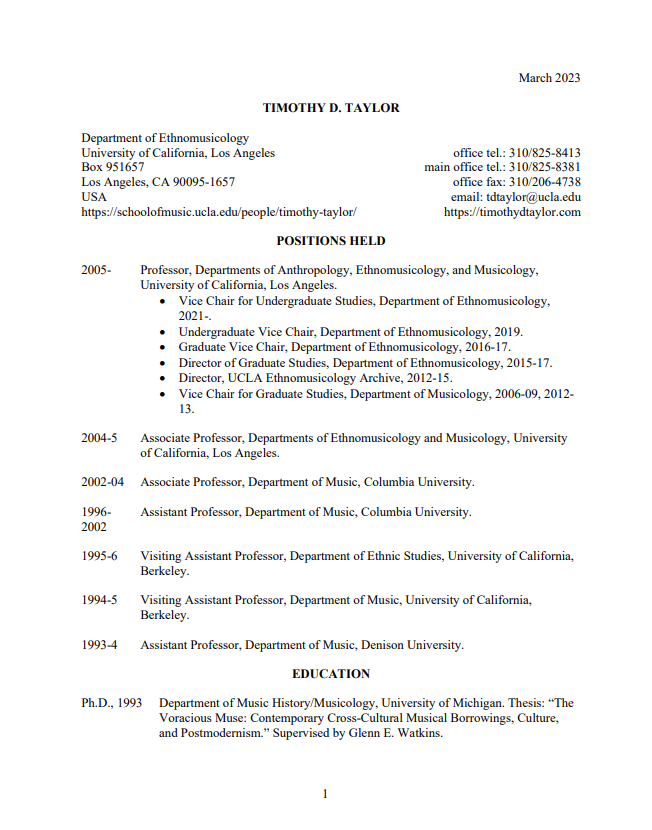
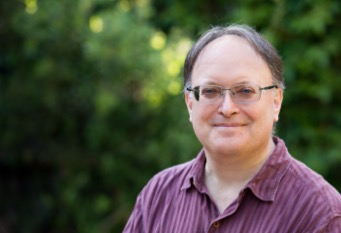
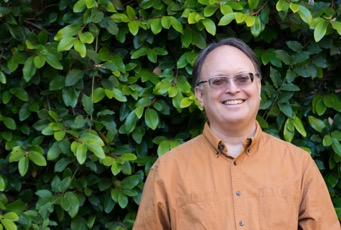
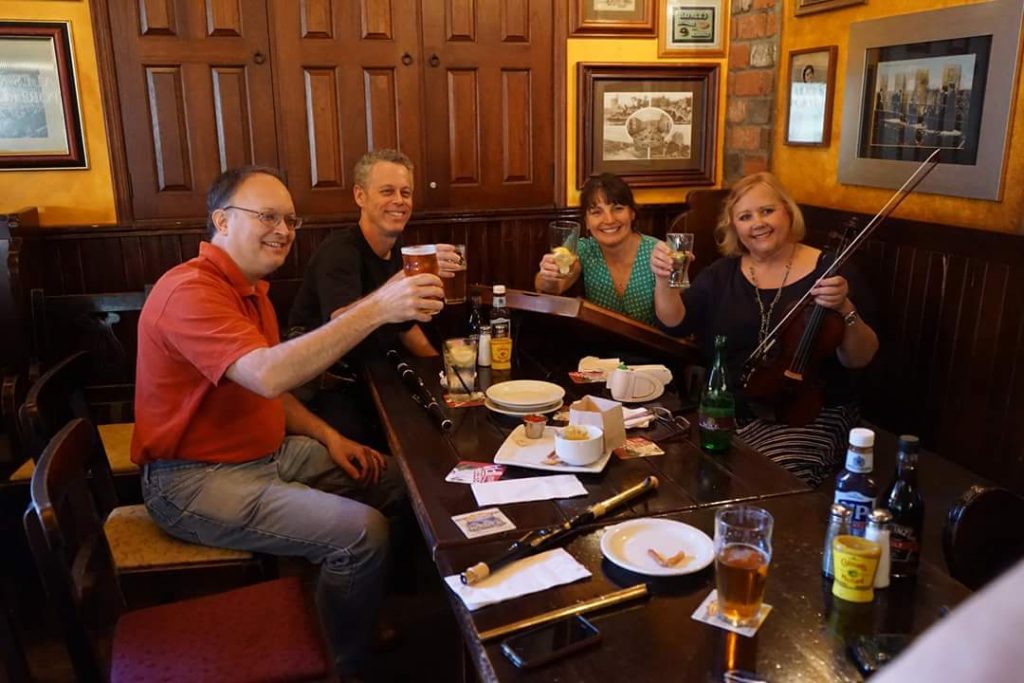
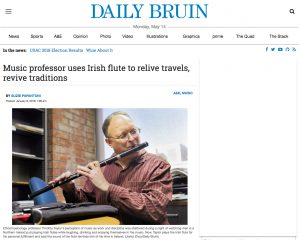
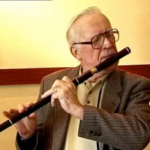
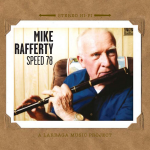
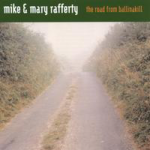 The Road from Ballinakill
The Road from Ballinakill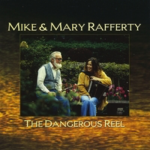 The Dangerous Reel
The Dangerous Reel